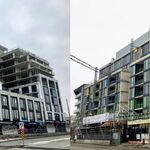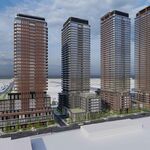amnesiajune
Senior Member
Here's some new photos from the Highway 404/Highway 7 Interchange Improvements by York Region, Opening late 2018
Aerial Norman Bethune Avenue And Aristotle Avenue Construction:
View attachment 140240
Completed Realigned Ramp:
View attachment 140241
Retaining Wall Construction Aristotle Avenue:
View attachment 140243
Construction Area Map:
View attachment 140242
These new streets opened up last night/this morning. Aristotle Avenue is basically an extension of the 404 off-ramp. I think you can turn right from Westbound Highway 7, but you can't turn left from Eastbound. And similarly you can turn right coming southbound, but not left.





